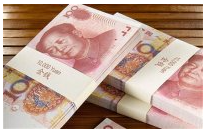Cash, please
adapted from an article by DAVID BARBOZA 1 LIN Lu remembers the day last December when a Chinese businessman showed up at the car dealership he works for in north China and paid for a new BMW 5 Series Gran Turismo ─ entirely in cash. "He drove here with two friends," Lin recalls. "One of his friends carried about $60,000 in a big white bag, and the buyer had the rest in a heavy black backpack." 2 Lugging nearly $130,000 in cash into a dealership might sound bizarre, but it's not exactly uncommon in China, where hotel bills are routinely settled with thick wads of renminbi, China's currency. This is a country, after all, where home buyers make down payments with trunks filled with cash. And big-city law firms have been known to hire armoured cars to deliver the cash needed to pay monthly salaries. For all China's modern trappings ─ the new superhighways, high-speed rail networks and soaring skyscrapers ─ analysts say this country still prefers to pay for things the old-fashioned way. 3 Doing business in China takes a lot of cash because Chinese authorities refuse to print any bill larger than the 100-renminbi note, about $16. Since 1988, the 100-renminbi note has been the largest in circulation, even though the economy has grown fiftyfold. Chinese economists and some government officials suggest that printing larger denomination notes might fuel inflation. But there is another reason. "I'm convinced the government doesn't want a larger bill because of 12 ," said Nicholas Lardy, a leading authority on the Chinese economy at the Peterson Institute for International Economics. "Instead of trunks filled with cash bribes you'd have people using envelopes."  4 All the buying, bribing and hoarding forces China to print a lot of paper money. China, which a millennium ago was the first government to print paper money, accounts for about 40 percent of all global currency output. Adjusting for the size of its economy, China has about five times as much cash in circulation as the US. As the 100-renminbi note has been made the largest bill, the nation's citizens need more of it to buy a television or Swiss watch, a car or a home. 4 All the buying, bribing and hoarding forces China to print a lot of paper money. China, which a millennium ago was the first government to print paper money, accounts for about 40 percent of all global currency output. Adjusting for the size of its economy, China has about five times as much cash in circulation as the US. As the 100-renminbi note has been made the largest bill, the nation's citizens need more of it to buy a television or Swiss watch, a car or a home.
5 Perhaps paper bills should come with a warning about 14 . Last month, a migrant worker in Shanghai discovered that mice had chewed into tiny pieces the $1,200 his wife kept in a closet. A local bank agreed to exchange the money if the man could reassemble at least three-quarters of a bill. "But the bills are now in small pieces and it's almost impossible to fix them," said Zhao Zhiyong, the 37-year-old worker. "Who could know that the money would be chewed by mice?" The Kathmandu Post, 2013 |